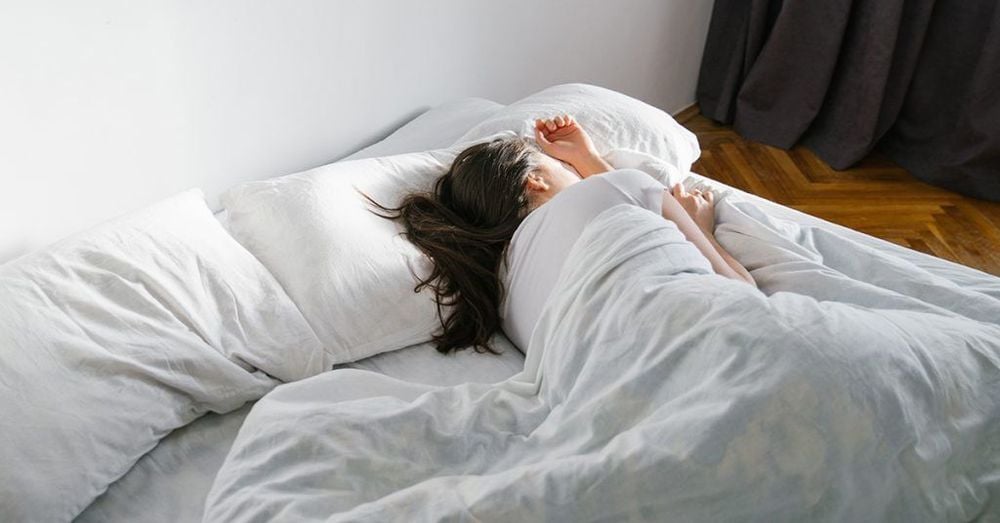This is an automatically translated article.
Moving in with your partner is not without its challenges. There are many cases of sleeping in the same bed, but some people have bad sleep habits or their partner sleeps less,... So how to deal with a bad "partner" in bed? This answer will be in the article below.
1. How to deal with a bad "partner" in bed?
For most couples, sharing a bed is one of the great joys of a long-term relationship. Those moments of falling asleep and waking up together are a major source of intimacy. But for a few couples who are experiencing "coping".
1.1. Bad sleep habits of your partner who sleeps little but sleeps in the same bed Your partner is, to put it as softly and lovingly as possible, but a terrible "partner" in bed when sleeping. You keep a long list of excuses she comes up with for not being able to sleep with you, and it includes: “You ate too many sweets at 3 p.m.,” “Beers taste bubbly and they make you sick. you're awake” and “Legs sticking out of blankets”
It didn't take long to ask her back. But as your relationship progresses, it becomes increasingly clear that the main obstacle to her getting a good night's sleep is sharing your bed. You wake up, roll over and ask her, "How did you sleep?" to which she often replies "You didn't." Good morning.
You've never experienced sleeplessness like this in any of your other relationships, and you're determined to conquer it and achieve that comfortable bed-life you feel entitled to. So, when you moved in together, you tried everything to make your dream come true such as: You put a curtain on the window, turning your bedroom into a lightless zone . You invested in many sleeping masks, that's how you found out that you couldn't stand sleeping masks. And your partner has tried several brands of earplugs. Even buying a full-size mattress and separate blankets only to find out that none of the beds seem to be large enough for you to sleep in with your partner.
While struggling to help your partner sleep, you begin to notice that her problems are affecting you. The stress of wondering if she'll be able to sleep, and the guilt of knowing that it's your fault if she can't, start to keep you up all night, exhausted with anxiety. That period marks a low point in your relationship.

Có một số thi quen của bạn cùng giường có thể ảnh hưởng tới bạn khi ngủ chung
After some fights where your partner accuses you of snoring and you have no plans to stop it's clear that you need a radical solution. So you've finally packed up your pillows and started sleeping in the guest room.
You are sad to have to go, but immediately, both your sleeping and waking life is dramatically improved. Sleepless nights are now almost a thing of the past, and time in your bedroom is comfortable. Instead of worrying about the moment the lights went out, the two were actually asleep.
There's a bit of a stigma around couples who don't share a bed, as it seems to evoke loveless (or at least sexless) relationships and can make you feel embarrassed get that. You've felt that perplexed and sometimes when you give guests a tour of the house, you call the second bedroom the "guest room," because it's easier to call it the "room where you sleep because you also yell at your partner and if you don't walk away she'll probably hug the pillow for you. "
Having a separate bedroom also comes with some nice perks. Now you can stay up late reading or watching TV as you please without disturbing your partner. And above all, you and partners start each day by jumping in each other's beds and it's really mean when you say good morning What's not to like about that?
Jamesha Edwards, 32, is no stranger to sleepless nights. her 40-year-old Lionel witnessed it with her snoring. "The snoring was really loud," she explained. He's panting and fighting in his sleep because he's trying to get some air." Edwards, a sales representative who lives in Pottstown, Pa., has alternated between sitting awake, worried about his health. husbands and are forced out of their bedrooms in search of peace and quiet
According to Charles W. Atwood Jr., MD, a sleep medicine physician at the University of Pittsburgh Medical Center, snoring is a complaint.
1 complaint by bed partners Small airways, enlarged neck, stuffy nose or blockage like tonsils can cause snoring Sleep apnea, a condition marked by breathing stopping for a while short, is another, more serious cause of snoring. "People with sleep apnea have a brief arousal, which restores airway sound, and will often gasp or snort. nose and the person may startle a little and then go back to sleep. This cycle can continue for dozens or hundreds of times.”

Ngáy ngủ là một trong các thói quen ngủ xấu của nhiều người
1.2. How do sleep problems affect relationships? Tossing, turning, or getting in and out of bed all night, along with insomnia, causes problems for couples. Involuntary jerky movements, too, are sometimes associated with restless legs syndrome.
Sleepless nights bring about more than just dark circles under the eyes. High blood pressure, heart attack, stroke, depression and distraction have all been linked to sleep apnea. Over time, insomnia "causes people to feel depressed, tired and less productive," "Their quality of life is diminishing."
Finally, the husband or wife was diagnosed with severe sleep apnea and is now sleeping on CPAP, or a continuous positive pressure ventilator, which uses air pressure to open his upper airway. Partners breathe easier at night. "You could feel the difference immediately," "It has created a whole new dimension to our relationship."
2. 7 ways to sleep better when sharing a bed with a partner who sleeps less
When it comes to sleeping together, what happens in bed before bed can often blind people to their partner's naps after the fun. You might hear things like, "She makes this funny sound when she's asleep, but sex is awesome." Little sounds can be forgiven early on in a relationship, but as time goes on and "funny" sounds turn into noise, feelings change. While snoring is probably at the top of most couples' compatibility agreement-breaker list, there's another, more confusing problem that can create more acrimonious relationships: Restlessness.
For most, sleep is a time of peace, quiet, and relaxation. So comfortable that most people are relatively immobile while sleeping (in dream sleep, we should be paralyzed!). Sure, we wake up to roll over, adjust our pillows, and so on, but these movements are often few and far between and not important enough for a partner to even notice.
Their bed partner is also not serene; they tend to look like someone has accidentally entered the aforementioned dance party and can't find the exit. For them, their rest can be violently disrupted all night long by tossing, turning, kicking, and other subtle body movements. Some observant partners may even notice that movements occur with predictable frequency (known as "cyclic limb movements").

Hãy tìm cách khắc phục vấn đề của bạn cùng giường khi ngủ chung
While some restless sleepers may find it uncomfortable to sit still while watching a movie at night, they are often particularly unaware of their legs moving during sleep. Here are a few ways to sleep better when sharing a bed with a low-sleeper partner.
Encourage your partner to consider seeing a sleep specialist This is especially important if your partner's restlessness has led to violent activities that put him/her or you at risk. dangerous. Even those with less dramatic restless sleep, although feeling their sleep as normal, had anything but normal sleep. Consider the fact that for every jerk and jerk that occurs during the night, their brain wakes up to make it happen. Furthermore, the discomfort they may feel while watching TV at night or difficulty sitting still on a long car ride or flight may be related to their sleep-related movements. Conditions such as restless legs syndrome and periodic limb movement disorder are treatable conditions that can make both or you sleep better than ever.
Choose your bed carefully Although everyone has a list of top bed features when shopping for a mattress, make sure that the bed the two of you buy doesn't move easily and is wide enough to you create a private space between you and your partner. You can take this one step further by using separate bedding/blankets, so you won't feel the flipping and pulling of your duvet cover!
Consider a weighted blanket For some restless people, adding extra weight, especially in the legs, can make a big difference in sleep quality. There are many weighted mattress manufacturers that can help you find the weight that works best for you.
Pay Attention to Iron Some individuals with low iron levels may exhibit restlessness at night. Talk to your doctor to see if ordering a ferritin level (a test that measures iron stores) is appropriate.
Watch these foods Ask your partner to eliminate chocolate, caffeine and/or MSG at night.
Consider taking a hot bath 30 minutes before bed. This may help some people sleep less restlessly.
Talk to your partner's family Some conditions that cause restlessness are highly hereditary. Where there is smoke, there is usually fire. Insomnia is a common disorder experienced by many couples. These strategies can help you avoid a “sleep divorce” (sleeping in a separate bed). Reach out to your partner's sleep family who can help you troubleshoot this.
Please dial HOTLINE for more information or register for an appointment HERE. Download MyVinmec app to make appointments faster and to manage your bookings easily.
References: healthline.com, webmd.com, menshealth.com












